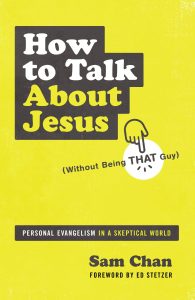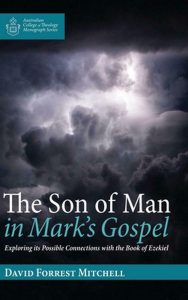November 4, 2020
 I was on Sam Chan’s list of people to read/review/promote his latest book and so Zondervan sent me a copy. It’s great little book, and especially useful for equipping/encouraging/inspiring those who are gifted in or eager to grow in the area of friendship evangelism. It’d also be very useful for ministry leaders wanting to think through what kinds of things they would need to promote and support if they were wanting to foster a culture of evangelism.
I was on Sam Chan’s list of people to read/review/promote his latest book and so Zondervan sent me a copy. It’s great little book, and especially useful for equipping/encouraging/inspiring those who are gifted in or eager to grow in the area of friendship evangelism. It’d also be very useful for ministry leaders wanting to think through what kinds of things they would need to promote and support if they were wanting to foster a culture of evangelism.
Brief and accessible
One of its strengths is its impressive brevity and accessibility: it is 140 pages and filled with Sam’s characteristic humour (me and my fifteen-year-old son laughed out loud at his outline of every sports movie ever :-D). The reason this is impressive is that there is no shortage of deep and complex missiological content in here. Sam introduces, explains, illustrates and applies big ideas—often taken from his 280-page textbook Evangelism in a Skeptical World—without getting overly technical or frustratingly brief.
This makes it great for reading through as a part of a team meeting, 1:1 meeting or easy to just give to another person and recommend that they read it.
I just looked up the price though, and astonishingly, it’s $25+ in Australia (!!). Gosh. That’s a bit rough for 140 pages :-/
And there IS an audiobook version too, which is great… but depressingly, it’s not read by the author, which is an enormous loss. Listening to some robot narrator guy read Sam’s content is almost comically weird!
This stuff is what we need to be thinking about in evangelism
Sam is right in arguing that the kinds of things he talks about in this book are especially important for Christians as we seek to be faithful to the great commission in a post-Christian world. Dare I say that these things are MORE important for a ministry like AFES to train uni students in than hours of memorising Two Ways To Live (of which I am a big fan, by the way) and doing walk-up evangelism?
A lot of it is a fresh take on friendship evangelism that in one sense is nothing new… although Sam brings his own new ways of thinking about it and approaching it, that is exciting and refreshing.
But in addition to this, he also brings more awareness of our cultural context and the sociological forces impacting on us all, which make us more savvy and alert friendship evangelists than we otherwise might be. This is what makes it a more missiologically sophisticated book on friendship evangelism than equivalent books from the late twentieth century. There are heaps of juicy insights, that might spark further thoughts and ideas in the reader, like:
- the difference between how Asian Australian and white Australian non-Christians think about the gospel,
- the way the primary school has in some ways replaced the church as the ‘village hub’,
- the different phases of life and the number of friends we have in each phase and
- the causes for modern urban loneliness.
Being aware of the people we are interacting with and the social context we find ourselves in helps us patiently and carefully and yet confidently go about the work of connecting with people and looking for opportunities to share the gospel.
Of course, it remains the case, once we’ve done all that, the work will still often be as slow as ever. It’s not as if you implement all the insights from this book and suddenly you’ll kickstart a post-Christian revival. Nope. Mission in the post-Christian Western world is still often slow and hard. But this stuff helps you focus your energy in the best way.
Frustratingly muted place for the cross
There was something that I found so frustrating that I was almost yelling at the book, the way you yell at the TV screen when the heroine in the movie drops the knife and runs away from the bad guy, before being 100% sure he’s dead: the strangely muted place the atonement plays in the book. The most striking example is the ‘jargon-free gospel message’ Sam provides on pages 73–74:
… There’s a God who loves us, made us, and saved us. And now we get to be part of his story. Every day is a day when I live for Jesus because he lives for me. Every day is a day when I can journey with Jesus and bring his love, mercy, and justice to this planet.
If this is true, then we are set free from our empty and self-absorbed lives. We are set free to admit that everything is not okay right now…. I’m not the person I pretend to be. But that’s okay. Because Jesus is perfect, so I don’t have to pretend to be perfect anymore. Jesus’ Spirit lives in me right now, and he loves me just the way I am.
But Jesus loves me too much to leave me the way I am. Every day is a day when he makes me more and more into the person he wants me to do be. Every day is a day when I can become my fully potential—not through my plan for myself, but through God’s plan for me. Every day is a day when I can be everything God has made me to be.
Wow. You see, if I were going to present a model ‘jargon-free gospel message’ I would celebrate more of what God has done for us in the atonement than simply saying ‘God saved us’ (ironically a jargon word). There is clearly some difference of emphasis going on here, because it was noticeable throughout this book and throughout the much larger Skeptical World book too.
Now, I’m not a highly strung ‘discernment-reader’, playing shibboleth-bingo, just looking for every author to use my key theological buzz words of ‘propitiation’ or ‘penal substitution’ or ‘justification by faith alone’. And I understand and fully agree that there are many aspects of the saving work of Christ and many ways that this can be expressed and that you don’t have to talk about everything in every gospel presentation. I get all that. That’s not my problem.
My problem is I feel like, in order to make these points, Sam relativises and de-centres the work of the atonement as one thing among many. But you can highlight diversity of ways ‘in’ to the gospel, while still preserving the central, unifying importance of the reality of God reconciling us to himself through solving the problem of his just anger against our sin. Just as much as I’d stress ‘tell stories about Jesus’ (ie tell stories from the gospels), I’d want some banner heading about ‘show the wonders of the atonement’ or something. I don’t think that comes across clearly in Sam’s two books on evangelism. Maybe it’s a failure of communication—at least in communicating effectively to this reader. But I wonder if it’s a slightly different of theological emphasis too? After all, Sam is a very thoughtful guy.
Can’t put my finger on it… but something about the place of the church?
This is a vaguer thing, but there’s something, and I can’t quite put my finger on it, that seems missing in this book (and Skeptical World) about the place of the church and its leaders and programs. It’s not that the church is absent from Sam’s writing and illustrations and examples. And it’s not that he’s championing independent solo-evangelists, or church-less cohorts of evangelists.
And yet… maybe someone else can help me out here? It’s like the church, its leaders and its programs are the furniture in the background. They’re there. They’re assumed. They’re seen as positive. But they’re not alive and active in Sam’s overall or vision, somehow?
I think John Dickson’s Promoting the Gospel (aka The Best Kept Secret of Christian Mission) is a helpful supplement, because John provides a vision for how the church functions in the mission—as a community, an institution and a group of individuals.
And it’s this absence, whatever it is exactly, that stops me from saying: ‘thinking through the stuff Sam presents is all an individual (or ministry leadership) needs to really get thinking about how to do mission effectively in a post-Christian world’. I would want to add something that helps us think through much more how the church needs to organise and structure itself.
Pitches itself as a book for ‘everybody’ but primarily is for the gifted
A final quibble. Sam pitches the book as as a book for your ordinary everyday Christian, for those who are not the ‘professional evangelist’. I think he thinks that the values and practices commended in this can be easily absorbed and implemented by all Christians everywhere.
Obviously this opens up the whole ‘is every Christian an evangelist?’ can of worms, to which my answer is ‘yes and no’. That is, I do think every Christian shares together a concern for and responsibility for the cause of world mission. And every Christian should be eager to share the gospel when they have opportunity, and see how they can adjust how they live and speak to facilitate this. So yes, in that sense How to talk about Jesus will be a great help for every Christian in thinking through how they might do that.
And yet I recognise the great diversity among Christians of our gifts, passions and circumstances. There are some of us who are uniquely eager and able to be engaged in the explicit activities of evangelism. Some of us who are set apart professionally or find ourselves in a context where there are more opportunities for evangelism.
And this is as true for those who are professional evangelists set aside for the work of public proclamation as it is for those who develop meaningful relationships with non-Christians and look for opportunities for conversation and invitation among those relationships.
From reading this book, Sam is clearly as remarkable gifted as a friendship evangelist as he is a public evangelist. I don’t read this and think ‘Oh gosh, he’s an ordinary every day guy just like me, I can do what he does’. I think ‘Whoah! he and his family are impressive in their capacity to organise themselves for the purposes of friendship evangelism… as well as all the OTHER things Sam does!’
If this book were to be for everyone, it’d be helpful to have more thinking through what these things look like for those who are not able, for whatever reason, to take on the full package of ‘being the unofficial chaplain’ and having people over for barbecues all the time. What’s the bronze medal version for the more socially awkward person, perhaps with lower social and workload capacity, or with other limiting circumstantial factors in their lives?
But it’s ok. We can all take up bits of ideas and practices and hints and tips that we can use in our context. And many who do have some degree of the gifts and opportunity will take heaps of inspiration from these pages. But I would commend this book with that caveat: this is how to fan into flames the gifts of the friendship evangelist. Not all of us can keep up with this standard, and we don’t need to.
Again, this is where the insights of John Dickson’s Promoting the Gospel are a helpful supplement, in giving a vision for the various other ways that Christians help support both the ‘professional evangelists’ and the gifted ‘friendship evangelists’ in the overall work of mission.
Conclusion: well worth it
I have some hesitations. But man, don’t mis-hear me: this is a very valuable and useful resource. Sam’s doing the work in helping evangelicals in the post-Christian world think through this stuff and he’s doing an admirable job, in a way that is gloriously easy to read. Even if he’s not doing it exactly how I’d do it, I’m thankful for the work he is doing for us and so think we need to benefit from all his wisdom and insight.
Is this a good one to read in your ministry teams, parish councils, elderships, AFES student committees, staff meetings, 1:1 meetings in 2021? Yeah for sure.





